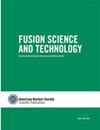铒薄膜注入氘离子合成氘化铒
IF 1.2
4区 工程技术
Q3 NUCLEAR SCIENCE & TECHNOLOGY
引用次数: 0
摘要
摘要本文介绍了将氘离子注入铒薄膜合成氘化铒的实验研究。热解吸光谱结果表明,合成了多种氢化物相,包括ErD3和ErD2。研究结果还表明,通过离子束轰击合成氘化铒时,不需要提高衬底温度来促进膜中氘的吸收。在氘离子浓度为3.6 × 1022 m−2的条件下,400 nm薄膜在1000 ev离子束下暴露5 h,其化学计量学达到了ErD0.21。在测试的实验条件下,发现氘吸收量与氘离子影响和离子能量成比例。二次离子质谱法证实了膜中氘的存在。关键词:氘植入材料科学披露声明作者未报告潜在利益冲突。数据可用性声明当前研究期间生成和/或分析的数据集可根据通讯作者的合理要求提供。其他信息资金:作者未获得任何其他组织对所提交工作的支持。本文章由计算机程序翻译,如有差异,请以英文原文为准。
Synthesis of Erbium Deuterides via Deuterium Ion Implantation into Erbium Thin Films
AbstractAn experimental study of a synthesis technique in which deuterium ions are implanted into thin films of erbium to form erbium deuterides is presented. Results from thermal desorption spectroscopy indicate the synthesis of multiple hydride phases has occurred, including ErD3 and ErD2. The findings also indicate that, for erbium deuteride synthesis via ion beam bombardment, elevated substrate temperatures are not required to promote deuterium uptake in the film. Stoichiometries of up to ErD0.21 were achieved for a 400-nm film exposed to a 1000-eV ion beam for 5 h at a deuterium ion fluence of 3.6 × 1022 m−2. Over the tested experimental conditions, deuterium uptake was found to scale proportionally with deuterium ion fluence and ion energy. The presence of deuterium in the film was confirmed by secondary ion mass spectrometry.Keywords: Deuteriumerbiumion implantationmaterials science Disclosure StatementNo potential conflict of interest was reported by the authors.Data Availability StatementThe data sets generated during and/or analyzed during the current study are available from the corresponding author on reasonable request.Additional informationFundingThe authors did not receive support from any other organization for the submitted work.
求助全文
通过发布文献求助,成功后即可免费获取论文全文。
去求助
来源期刊

Fusion Science and Technology
工程技术-核科学技术
CiteScore
2.00
自引率
11.10%
发文量
60
审稿时长
3 months
期刊介绍:
Fusion Science and Technology, a research journal of the American Nuclear Society, publishes original research and review papers on fusion plasma physics and plasma engineering, fusion nuclear technology and materials science, fusion plasma enabling science technology, fusion applications, and fusion design and systems studies.
 求助内容:
求助内容: 应助结果提醒方式:
应助结果提醒方式:


